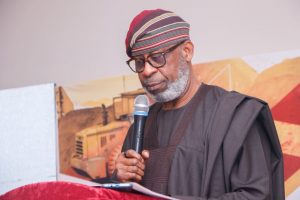Worried by consistent challenges the country has been experiencing in electricity supply experts in the power sector have proffered Constitution amendment as panacea.
In a recent issue of EmPower magazine, a Nextier Quarterly on the Nigerian Electricity Supply Industry, the experts contended that a change to Nigeria’s Constitution might be the route to more electricity supply for Nigerians.
According to them, “Despite an installed generation and transmission capacity of 12,522 megawatts (MW) and 8,100 MW, Nigeria’s electricity supply industry provides about 4,000 MW of electricity to 195 million people. The country needs a radically different approach.
“Empowering Nigerian states to generate and transmit electricity provides them with more freedom to explore enhanced electricity availability and stabilisation opportunities.”
They argued that, “Nigeria’s electricity industry has had its fair share of legal reforms, from establishing state-owned public utilities to privatisation legislation. Constant among these reforms is the central regulation of the industry, a direct consequence of the institutionalisation of the sector in Nigeria’s Constitution.
“The Constitution empowers the federal legislature with unlimited legislative authority to make laws regarding the generation, transmission, and distribution of power in the country. The same Constitution empowers individual states to make laws regarding electricity supply for areas outside the national grid.
“A Constitutional amendment proposed by Nigeria’s National Assembly in March 2022 seeks to grant State governments parallel legislative power with the Federal government to regulate electricity operations within their jurisdiction, in all areas without exclusion.
“This proposed amendment raises specific questions. Can the States effectively legislate on electricity generation, transmission, and distribution? Will such devolution of powers increase the electricity supply to Nigerians?”
Nextier, however, believes that the answer depends on how Nigeria navigates various operational, legislative, legal, financial, and technical factors.
“The modalities for operating and integrating existing infrastructure to implement State-specific laws bear some risks for Nigeria’s electricity infrastructure. Without careful planning and more diligent implementation, activities from the different states can potentially break an already weak national electricity infrastructure.
“Achieving the proposed Constitutional Amendment requires the consent of at least two-thirds of Nigerian states. This requirement means that at least 24 of the State Houses of Assembly must consent to this idea on behalf of their people,” the experts maintained.
They further stated that, “While securing this consent should not be a problem, however, given the country’s deplorable state of electricity supply there is a risk that the current political season may drown out such effort.
“Furthermore, some of the states in worse financial straits than the rest may be unwilling to pass the resolutions affirming this amendment. Moreover, the subsisting political dynamics may influence President Muhammadu Buhari’s assent to the proposed amendment.”
On the legal front, Nextier noted that federal law takes precedence over state law on items on the concurrent legislative list.
“This reality means states may have limited authority to reinvent the wheel or deviate from extant laws. With many Nigerian states tethering on the brink of bankruptcy, there is a risk that they may lack the financial capacity to take on the requisite capital expenditures needed to implement the Constitutional Amendment. Therefore, the States must create models for partnering with the private sector to generate and transmit electricity.
“The technical capacity to effectively regulate the new electricity operations within their states is also a concern. While there is an increase in the number of skilled personnel in the industry, there is hardly enough to satiate the expected demand if all the states decide to implement it simultaneously.”
According to the Nextier article, if the proposal scales these formidable hurdles, the states must consider other actions to promote a harmonised electricity sector including how to align with the federal institutions in the electricity industry.
“The states must coordinate with the Federal Ministry of Power on electricity policy. In addition, they must align with the Nigerian Electricity Regulatory Commission (NERC) to coordinate regulations. Indeed, the States may have to replicate some aspects of the federal regulatory structures at the local level.
“Furthermore, the states must work with experts in the different parts of the industry to midwife a successful state regulatory transition—infrastructural collaborations and investments.
“The proposed amendment, if diligently implemented, would lead to an increased power supply to Nigerians. However, this proposed amendment is not a magic wand. If it becomes law, each implementing state must ramp up its implementation ability,” added.




